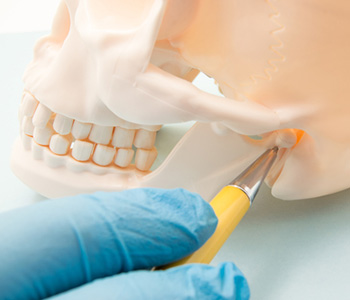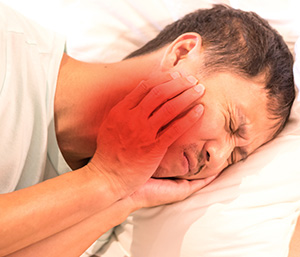Disorders of the temporomandibular joint are associated with a multitude of symptoms. Nashua Cosmetic and Restorative Dentistry sees many patients who complain about difficulty with opening and closing their mouth, like it’s stuck, or the same motion may elicit a clicking or popping sound. But one of the most common symptoms is pain, which can take on many forms. If you are wondering how to find pain relief for TMJ disorder, you’re at the right place. Dr. Smith has both the diagnostic tools and treatment options to relieve your symptoms. This expertise has helped patients reduce their reliance on pain medications and anti-inflammatories.

A pain in the jaw
The temporomandibular joint (TMJ) behaves like a hinge, connecting the jawbone to the front of the skull on both sides of the face. When the TMJ works at is should, your jaw moves in all directions for effortless and painless chewing, yawning, and speaking. When TMJ and the system of muscles, ligaments, nerves, and vessels don’t function as they should, the movement needed to chew, speak, or otherwise use your mouth efficiently is impeded. Temporomandibular disorder (TMD) is a painful condition. The many types of pain that are related to disorders of the TMJ include:
- Radiating facial pain
- Neck pain
- Tenderness in the shoulders
- Discomfort in and around the ears, along with ringing of the ears
- Headaches
- Toothaches
- Uncomfortable bite (discomfort associated with how the upper and lower teeth come together when you bite down)
It’s estimated that more Americans have TMD, at 5 percent to 12 percent, than lung and kidney conditions. These estimates are conservative; TMD is an underdiagnosed problem. In its early stages, symptoms are often dismissed as everyday nuisances, or they may be mistaken for other problems, such as ear infections. For many, relief comes in the form of medications that often provide temporary relief but are not a long-term fix, nor do they are address the source of the problem.
Our doctors prefer, and are equipped, to identify the source of the problem. So, you can benefit from treatment. Due to the location and nature of the TMJ, dentists are in a unique position to identify problems and offer effective, tailored treatment. They may notice excessive wear to the teeth that can be indicative of conditions such as bruxism. Bruxers grind and clench their teeth, usually at night while sleeping or while concentrating during the day. Bruxism and TMD are related conditions. Bruxism stresses the TMJ and is linked to inflammation around the joint. The good news is, bruxism responds well to splints.
Pain relief (and more) with oral appliance therapy

There are many different types of oral appliances. Depending on the results of your diagnostic evaluation at Nashua Cosmetic and Restorative Dentistry, Dr. Smith may recommend a specific type of oral appliance: a splint. Effective treatment doesn’t mean aggressive treatment. In fact, the process of getting relief from TMD symptoms, while also protecting your teeth from damage, starts with using a model of your mouth to create a splint that conforms to your teeth. Proper fit is of utmost importance, as devices that don’t fit well can put further stress on the TMJ, additional pressure on the teeth and, altogether, that means more pain for you. For night-time bruxers, these dental appliances are worn while they sleep. As bruxism is often a sleep-related movement disorder, patients who wear the splint enjoy many benefits; pain is reduced as less force is placed on the jaw and TMJ. Furthermore, teeth are protected from the dental conditions that arise among bruxers. Chipped and cracked teeth are frequent signs of bruxism, and they may require restorative treatment with porcelain veneers or crowns.
Whole-picture, whole-patient treatment
Dr. Smith knows that a lot of factors can contribute to a single condition. Even something as simple as a chewing gum habit can place undue stress on the TMJ and contribute to inflammation. Nashua Cosmetic and Restorative Dentistry looks at all the habits and lifestyle factors that may be responsible for TMJ problems and associated pain. Your dental team can show you exercises and make other recommendations to avoid overuse of the jaw muscles, or to stretch and fortify those muscles. Call (855) 363-3793 to schedule an appointment and get lasting relief from TMJ symptoms.








